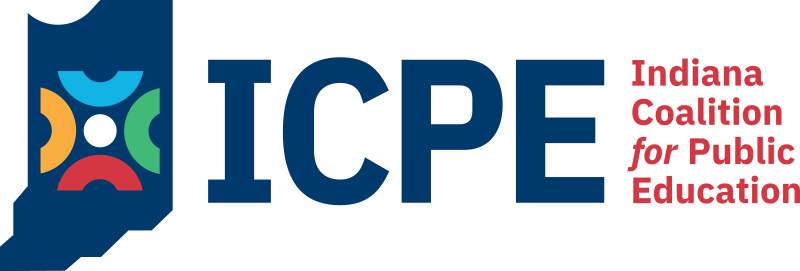Funding Slashed—What Will Your Schools Cut? Recap of ICPE’s 15th Annual Meeting
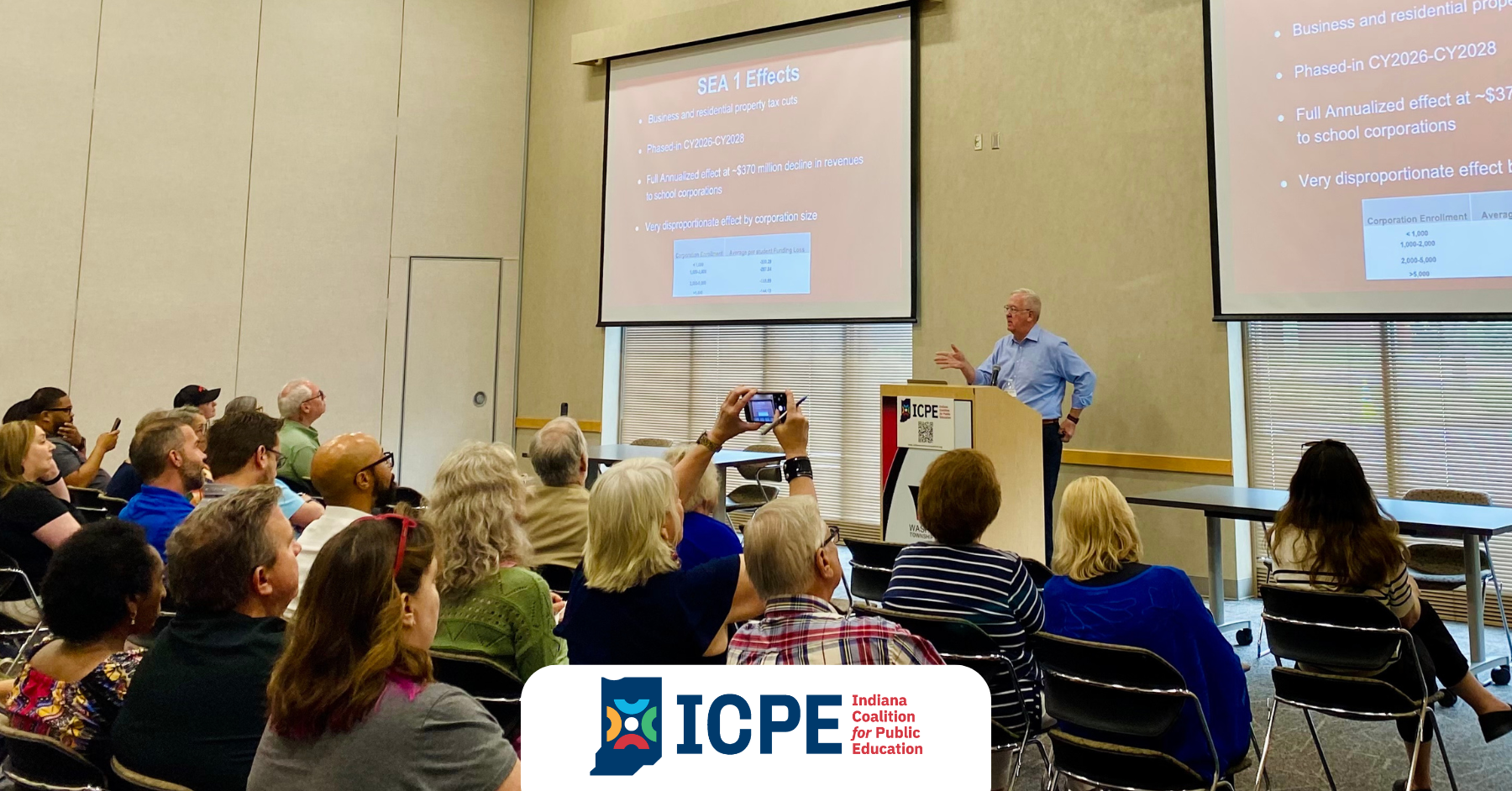
Indiana Coalition for Public Education held its 15th Annual Meeting on Saturday, August 23, 2025. ICPE lobbyist Mr. Joel Hand served as emcee, while Dr. Michael Hicks, Dr. Jennifer McCormick, and Dr. Gwen Kelley presented on the following topics:
- News from ICPE
- 2025 legislative recap
- The economy and education
- Public schools as essential to democracy and community cohesion
- Ensuring adequate, sustainable funding for public education
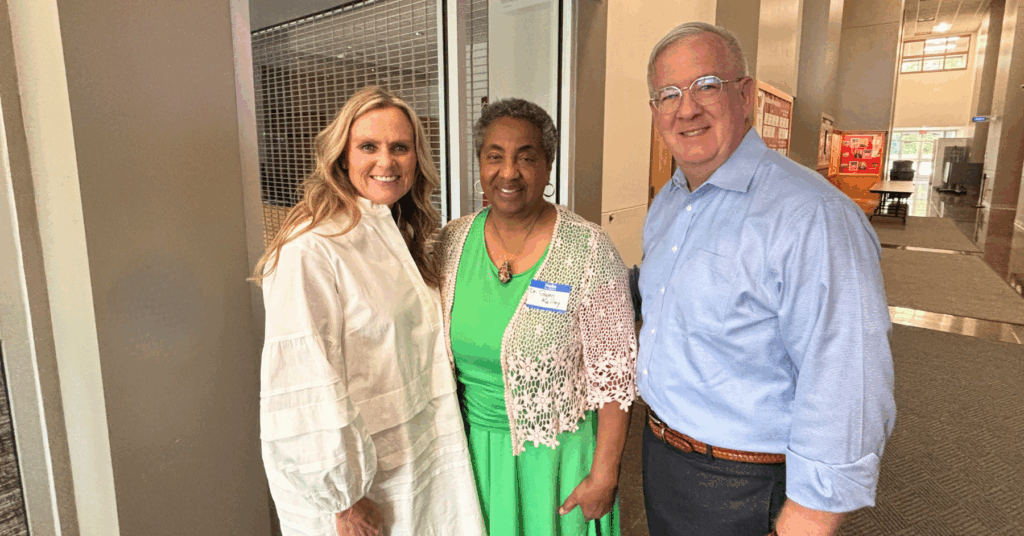
Together, these discussions underscored the critical connections between sound policy, economic stability, and strong public schools, highlighting how these three elements form the foundation for thriving communities and a healthy democracy. Keep reading below to see a detailed account of each speaker’s presentation.
News and Thanks from ICPE
This has been an eventful year. We at ICPE are thrilled to welcome four new board members in 2025. You can read about all our board members on our website.
- Jim May
- Dr. Gayle Cosby
- Dr. Phil Downs
- Leslie Rittenhouse
In February, we held our President’s Day of Action at the Statehouse and took advantage of the opportunity to honor Marilyn Shank, who has organized numerous Statehouse Days for us over the years, for all of her hard work and dedication.
ICPE would be lost without the energy of its members. Here are just a few who have done so much for us:
- Steve Brewer for organizing the Grassroots Check-ins Zoom calls
- The Experienced Educators of East Central Indiana, (especially Gayle Gernand, Kathy Flatter & Janet Burrows) for developing the Give Me Five call out during the legislative session
- The Bill Tracking Team of Sue and Larry DeMoss, Sharon Roulet & Keri Miksza
And, of course, thank you to all of you! Yes, you, who joined ICPE, made endless calls, sent emails, showed up to the statehouse, and spoke with your friends and neighbors to fight to keep education public, well funded, and a cornerstone of democracy. We could not do this without you.
2025 Legislative Recap
Between our lobbyist Mr. Hand and our active membership base, ICPE was very engaged this past legislative session. We conducted calls to action on 15 bills that we deemed most important and pertinent to our mission. Not all bills were bad. There were two bills that we supported, although neither of them made it through the session. Of the 13 we opposed, 6 passed directly, 5 were absorbed into other bills that were eventually passed, and 2 failed altogether.

It was a tough session, but we are already gearing up to fight again next year. A growing number of parents, educators, and other citizens are beginning to understand the magnitude of the threat to public education. We need your help to join their voices with ours, because together, we are not only louder—we’re stronger .
Read the ICPE legislative summary.
Read pertinent commentary by our board member, Jim May.
The Economy and Education
“We are in a recession. The only thing economists can’t agree on is the exact start date.” This was the start of Dr. Hick’s presentation, followed by an analysis of the importance of investing in education from pre-K through higher ed, and Indiana’s unfortunate disinvestment in education over the past 15 years. Disinvestment is counterintuitive for a state that is striving to become an economic powerhouse because, as Dr. Hicks clearly puts it: “Education is the cause of economic growth.” There is no new influx of jobs for Hoosiers with only a high school diploma. He also pointed out an important factor often overlooked in discussions of education: locations where a higher percentage of people have college and advanced degrees also experience higher salaries for those who have only a high school diploma.
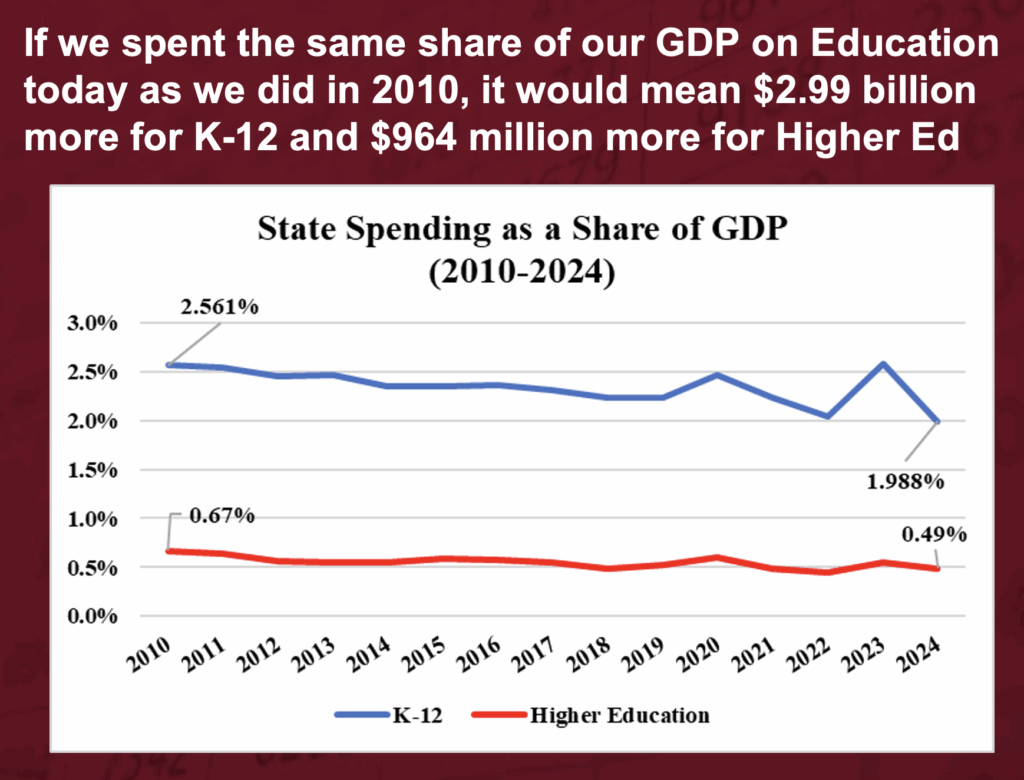
Indiana is not investing in education like it used to. The state is spending over $3.5 billion less on K12 and higher education. Disinvestment is counterintuitive for a state that is striving to become an economic powerhouse because, as Dr. Hicks clearly puts it: “Education is the cause of economic growth.”
Dr Hicks closed his presentation with an analysis of SEA 1 (called SB 1 during the session), which showed a win for business, but a loss for communities and, specifically, public schools. The bill harms small and rural schools the most, with his analysis showing that those schools are losing $330 per student on average. This dramatic loss leads us to question: Is SEA 1, in effect, a rural school consolidation bill? Time will tell.

As of now, the effects of SEA 1 are being felt in school districts via cuts in programs, courses, staff, curricular materials, and transportation. Even field trips have been cut from one district. Will the cuts from the state—and the federal funding unknowns—lead to the elimination of items like sports programs or even the closure of schools?
You can review Dr. Hicks slides here.
Public Schools Support Democracy and Foster Community Cohesion
Dr. Kelley spoke on behalf of the NAACP. She touched on the vital role of traditional public schools, the need for the same level of accountability and transparency for all schools that receive public tax dollars, and the importance of community. “Public schools are the heartbeat of our democracy.”
The Indiana NAACP proposes to
- Restore and expand Pre-K access statewide
- Protect essential district operations like transportation and safety
- Fund equity measures for poverty, multilingual learners, and special education
- Establish a community impact test before school closures or conversions.
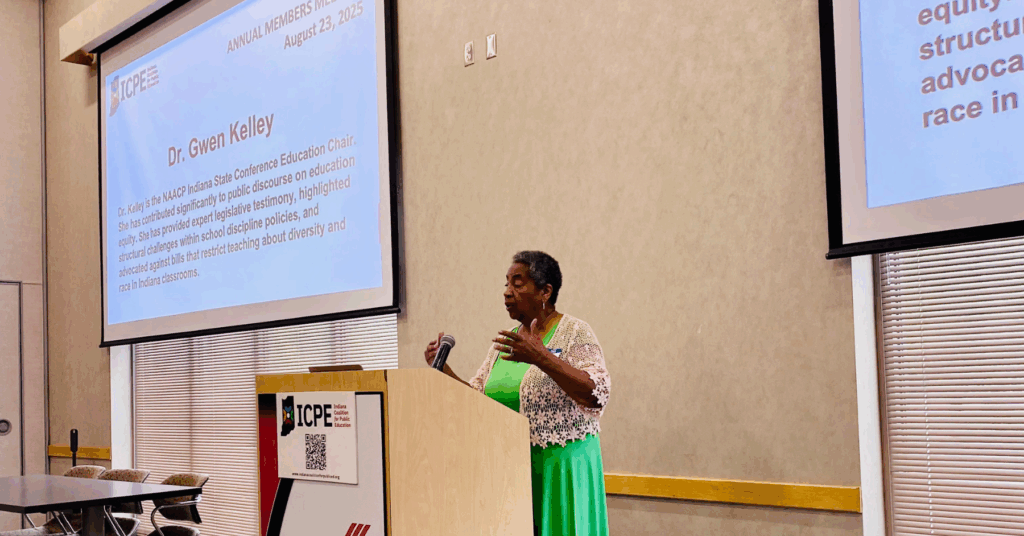
“When you dismantle a public school, you don’t just close a building—you close a hub of democracy, connection, and belonging.”
Ensuring Adequate, Sustainable Funding for Public Education
The IREAD success illustrates that funding education works. Dr. McCormick spoke on a few topics, but her most striking observation concerned the success of teachers and students on IREAD this past year. IREAD is administered in third grade and this past year’s third graders began kindergarten in 2021-22. They are the first post-COVID cohort, meaning their schooling was not interrupted by the pandemic. They are also the first cohort to fully benefit from the ESSER II funding from the federal government as well as private donations that enabled the implementation of the “science of reading” program. Keep in mind, ICPE is against high-stakes standardized tests and mandated retention, and we know that the science of reading rollout was flawed—the cart had been placed before the horse by our legislators. That said, the increased percentage of third graders who passed the exam as well as the growth achieved is a testament to the importance of fully funding education–not to mention the hard work of teachers and the kids themselves.
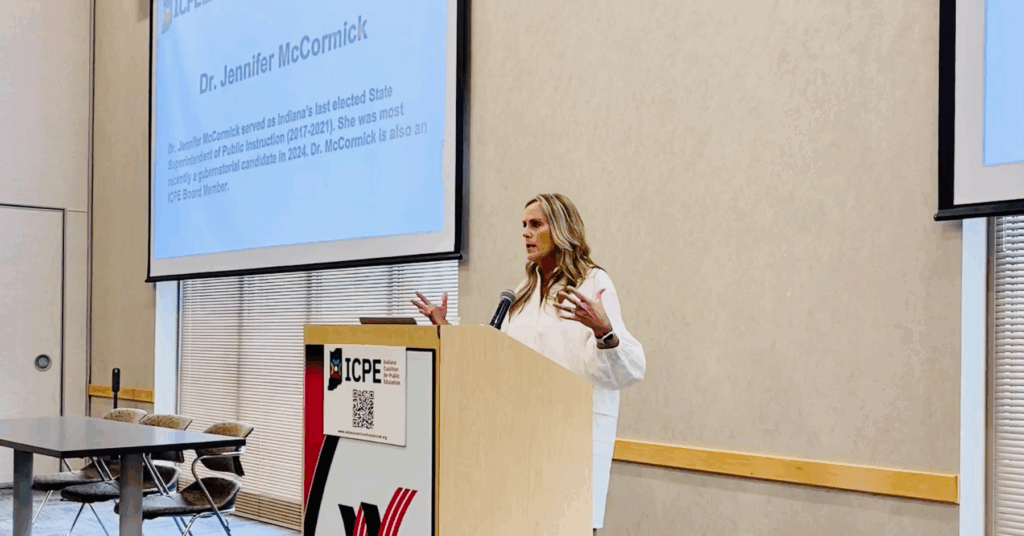
Legislators often ask what does fully funded mean? How much money do public schools need? One answer is enough money to make sure we climb instead of fall in comparative state rankings. We need enough funding to ensure community schools stay open and can educate the whole child. There must be enough resources to allow public schools to legally meet the requirement and mission to educate ALL children. There must be enough funding to provide transportation and to pay teachers a professional salary. Public schools must have enough funding so that they can fulfill their promise to help ensure a better future for our children, our communities, our state, and our nation.
